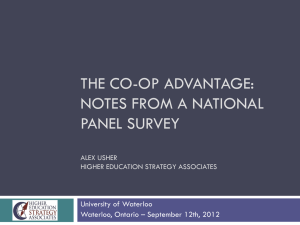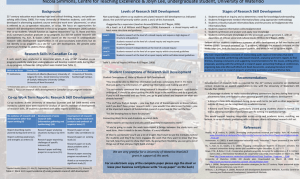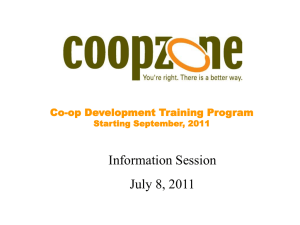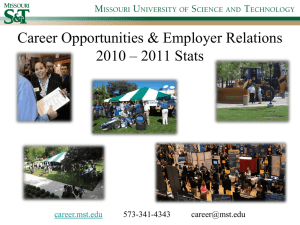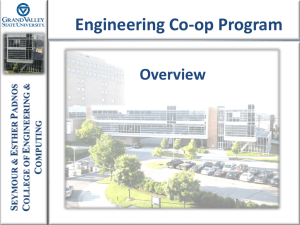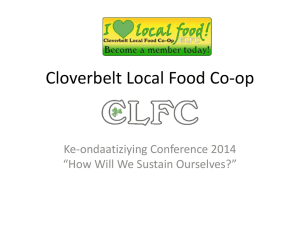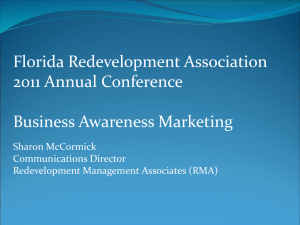Co-operative Education in Canada and the US
advertisement
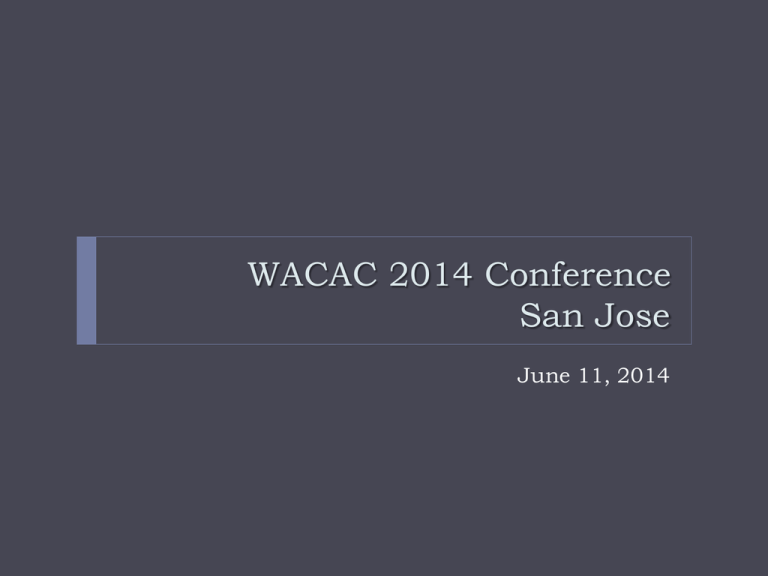
WACAC 2014 Conference San Jose June 11, 2014 Co-operative Education in Canada & the United States Stephanie Ranslow, Northeastern University Tony Munro, University of Waterloo Outline Experiential learning co-operative education Co-operative education vs. internships Basics of co-operative education How it works? Benefits of co-operative education to academic institution Benefits of co-operative education to students Why experiential education is important Growing focus on ‘outcomes’ in education Accountability Education as an investment Establish connection between academic learning and work application Learning by doing Unfamiliar situations = new learning Informed career decision-making Co-op vs. Internships Co-op clearly defined, full-time positions away from the classroom, with specific learning outcomes the experience integrated into the curriculum. Internships often Ill-defined, unpaid, part-time may be during academic semester may or may not be related to major or interest lack of integration into the academic experience usually no longer than three months Co-op basics Employment integrated into the academics Multiple work terms Test career options Head start on the job market Exploration/preparation prior + Reflection/integration after Students need to be responsible for decision making (competitive process) with significant resources to help them Opportunity to establish contacts and develop your professional network Graduates are ‘work-place ready’ History and evolution of co-op at Northeastern 1909 Earn to Learn Combine work with school in order to pay the bills Co-op program begins with just eight students working for four Boston employers 1980’s National Growth 37 States Across the Country Concentrations in: New York City, Washington D.C., and the West Coast, including San Diego and Silicon Valley 1980’s International Co-ops offered “Handful” of students participate Now 7200 Students participate yearly in Co-op 300 Students participate yearly in International Co-op Co-operative Education structure Preparation Complete mandatory Co-op Prep course Participate in advising sessions with Co-op Faculty Coordinator Navigate Employer Database Search, sort, and select co-op positions based on major, interests, skills Build preference list of positions and submit job preferences to co-op coordinators Track placement process, interview, accept position Calendar Consists of alternating periods of academic study with periods of substantive full-time employment Promotes integrated learning and application of concepts Sample 5 year co-op schedule Fall Semester (Sept. to Dec.) Year 1 Year 2 Year 3 Year 4 Year 5 Spring Semester (Jan. to Apr.) Summer Session I (May to June) Summer Session II (Jul. to Aug.) CLASS CLASS VACATION VACATION CLASS CO-OP CO-OP CLASS CLASS CO-OP CO-OP CLASS CLASS CO-OP CO-OP VACATION CLASS CLASS Sample 4 year co-op schedule Fall Semester (Sept. to Dec.) Year 1 Year 2 Year 3 Year 4 Spring Semester (Jan. to Apr.) Summer Session I (May to June) Summer Session II (Jul. to Aug.) CLASS CLASS CLASS VACATION CLASS CO-OP CO-OP CLASS CLASS CO-OP CO-OP CLASS CLASS CLASS Sample employers Co-operative education at Waterloo 5 or 6 four-month work terms completed in alternating sequence with academic terms Centrally administered through Co-operative Education and Career Action department (125+ staff) Job development Online recruitment process On-campus interviews Career development workshops Student Advising on campus and on work term Employer relationship management WatPD: online professional development program focused on enhancing connection between the workplace, the academic courses and eventual career path Geographically distributed staff maintain local contacts Integration of work experience and academic learning at Waterloo Work term performance evaluation WatPD courses (4 course requirement) Co-op Fundamentals* Critical Reflection and Report Writing* Communication Teamwork Project Management Problem Solving Conflict Resolution Intercultural Skills Ethical Decision Making Professionalism and Ethics in the Workplace Engineering Workplace Skills I: Developing Reasoned Conclusions* Engineering Workplace Skills II: Developing Effective Plans* Common threads through all courses: Critical Reflection, Professionalism, Technology, Continuous Learning, Diversity, Ethics, Collaboration Completed online while on work terms (one course/term) Benefits of co-op education to the university Enhanced reputation among employers Leaders of tomorrow Experienced graduates Entrepreneurial mindset Innovation Attracts career-focused and motivated students Promotes research linkages & innovation Encourages relevant course content Lower debt loads among graduating students Outcomes of co-op education for students Opportunity to ‘test’ potential careers Networking with potential employers and mentors Professional and personal development Informed academic & career choices Increased motivation Earnings while still in school Manage debt load Enhanced employability upon graduation Earlier job offers & higher starting salaries Perspectives Student: The connections you make with employers can help you move closer to the goals you already have, OR they can help you realize that you should rethink your career plans. Employer: Our co-op students are able to adapt to geographic changes, relocation challenges, and corporate cultures. The co-op program enables GE to monitor Northeastern’s students for future employment. Mohammed, Ghana Kristen Picano, GE Distribution Northeastern: We believe in experiential learning because it deepens a student’s knowledge and learning. The result may very well be employment or graduate school, but those do not drive our belief in the power of this educational model. The learning that happens does… Dr. Susan Ambrose, Senior Vice Provost for Undergraduate Education & Experiential Learning. Career Success and Co-op NORTHEASTERN: Ranked #1 by Princeton Review in Career Services On average, more than 51% of students receive a job offer from a previous co-op employer More than 90% of our graduates are either employed or enrolled in graduate school nine months after graduation 87% of these graduates are doing work related to their major Questions/Discussion s.ranslow@neu.edu tmunro@uwaterloo.ca
